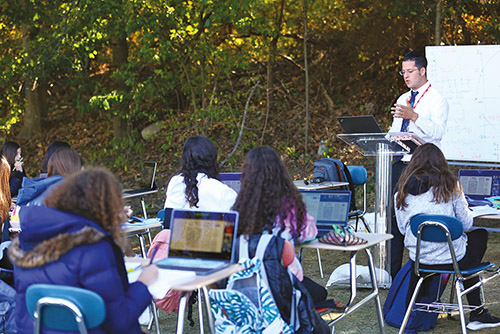
In late December it became clear that the second large federal COVID-19 aid package, passed earlier that month, had significant funds that could go to nonpublic schools—without the restrictions that sharply limited aid to nonpublic schools in the first federal COVID-19 aid bill. What was not clear was how much of the aid in the December bill would go directly to nonpublic schools.
That’s when the Teach Coalition stepped in and, with their partners in Christian and Islamic school organizations and administrators in yeshivot and day schools, worked closely with government officials in New Jersey and New York to advocate for the most equitable funding to nonpublic schools. After months of careful lobbying, they reached successful outcomes in both states.
To better understand the scale of this success, it helps to look back to the initial COVID-19 relief package, the CARES Act, passed in the spring of 2020. That bill directed a significant amount of funding to education, yet the funds for public and nonpublic schools were commingled, with public school districts assigned to provide “equitable services” to students in nonpublic schools. The precise meaning of and formula for “equitable funding” was not defined and subsequently many nonpublic schools did not receive much or any funding from that aid bill.
When the U.S. Congress considered their second COVID-19 relief bill in fall 2020, it was clear that they learned from the shortcomings in the previous bill regarding education funding. Congress set aside a distinct stream of funding for public schools and another for nonpublic schools, the latter termed “Emergency Assistance for Nonpublic Schools” (EANS). A total of $2.75 billion was allocated to EANS funding and distributed to states based on population, with New York receiving $250 million and New Jersey receiving $68 million.
The EANS funds were directed to the governors in each state, who would determine the best formula for distribution. Nonpublic schools could request reimbursements for COVID-19 expenses (called “allowable uses”) going all the way back to the start of the pandemic.
In New Jersey, Teach NJ worked with officials in Governor Phil Murphy’s office and in the New Jersey State Department of Education to fashion a fair formula for distribution. They argued that the fairest way to distribute the funds was based on enrollment, since all students faced similar challenges with remote education during the COVID-19 closures. New Jersey officials accepted Teach NJ’s approach and, in balancing federal guidelines, set the distribution formula of the funds as 60% based on enrollment, 20% targeted to schools with low income students (based on federal school lunch program participation) and 20% based on COVID-19 impact.
In New Jersey the application period opened on March 24 and applications are due by May 12; funds will be distributed in August.
In New York, Teach NYS worked with officials on Governor Andrew Cuomo’s Education Policy Team and Budget Team, as well as leaders in the New York State Department of Education. They made a similar argument and achieved success in setting the funding formula there as well. New York State’s funding formula provides 35% based on enrollment, 35% targeted to schools with low income students, and 30% based on COVID-19 impact, with strict standards established to apply for the last category of funds.
The Teach Coalition is justifiably proud of their efforts to secure significant funds for nonpublic schools in both states. “Any portion of funding distributed based on enrollment is a victory for our schools so we’re very grateful for that,” stated Dan Mitzner, director of state political affairs for the Teach Coalition. “The pandemic does not discriminate between public and private schools so government funding shouldn’t either.”
Yeshiva and day school leaders are similarly enthused with the results of the Teach Coalition’s work. “The EANS support has been directly linked to our ability to keep our day schools open this year,” said Rabbi Binyamin Krauss, principal of SAR Academy in Riverdale. “We were able to modify classrooms, improve air circulation, expand our cleaning staff and provide them with the necessary materials to keep children in school with very low levels of in-school transmission of the virus. We are beyond grateful to TEACH NYS for advocating for our schools, and for helping us to navigate the process of accessing these funds.”
The Teach Coalition held a webinar in New York and plans to hold a webinar in New Jersey shortly, to advise yeshivot and day schools on how to apply for the EANS funding. They will also be providing FAQ/guidelines shortly and be available for one-on-one consultations.
By Harry Glazer









